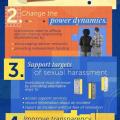On June 12th, the National Academies of Sciences, Engineering and Medicine published their report: Sexual Harassment of Women: Climate, Culture, and Consequences in Academic Sciences, Engineering, and Medicine. You can also read the press release by clicking here.
The infographic is available here: 
There was a webcast of the release of the report, and there is another one scheduled from 12-6pm ET on June 26:
How can academic institutions and other industries improve in the #MeToo era? Join the National Academies of Sciences, Engineering, and Medicine on June 26th for discussion with leaders in higher education and those in entertainment, technology, medicine, and politics, about what actions can be taken to prevent sexual harassment. The discussion will revolve around a new report by the National Academies that presents a comprehensive review of the research, experiences, and effects of sexual harassment on women and their careers in science, engineering, and medicine. In addition to evidence-based findings, the report provides recommendations for how organizations can prevent and address sexual harassment in academic settings, specifically in science, engineering, and medicine. Register for this on your own or let Marci Levine know if you're interested in viewing together.
Statement from AWIS, Association of Women in Science on the report:
